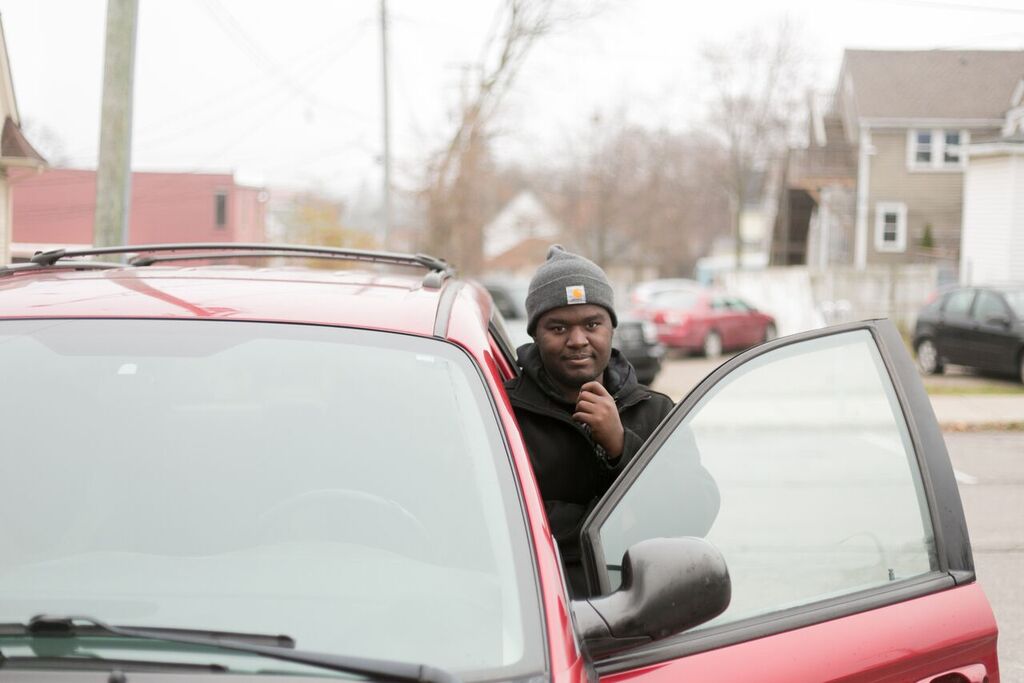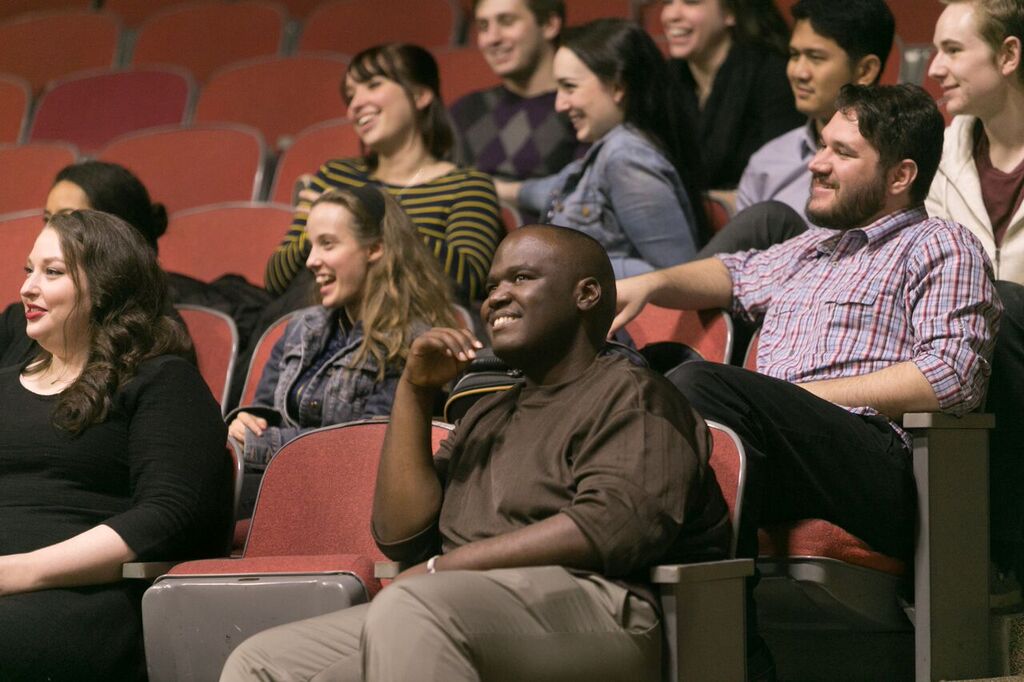Homeless EMU student grateful for more than money

YPSILANTI – On the night of Dec. 17, Ramone Williams found an empty bench and fell asleep at the Eastern Michigan University library computer lab, the spot where the homeless college student typically spent his nights. It could have been his last warm night. He wasn’t sure where he’d sleep over the next two weeks – the library was closing for the holidays, and sleeping in his minivan over a Michigan Christmas would be dangerous.
By the time he awoke the next morning, strangers had donated more than $6,000 to the Flint native. That figure would balloon to more than $25,000 in just five days, and likely would have grown much larger if Williams hadn’t requested a GoFundMe account set up in his name be shut down.
“The money is nice,” Williams said, “but what I really appreciate is people smiling and talking to me.”
His sudden change in fortune followed an article in Bridge Magazine, which described how Williams could only afford tuition or rent, but not both, and chose to finish his bachelor’s degree. And so he slept in the EMU library and showered in the recreational facility. He survived by looking for campus events serving free food, and bringing his own tea bag to add to hot water at a local donut shop.
“Now people are going out of their way to say hi. I got like a million Facebook messages. I love that. I feel more confidence when I walk around, like I belong here.” ‒ EMU student Ramone Williams, on reaction to a Bridge article on his homelessness
His story of perseverance led to an outpouring of support for the 26-year-old, who is one of an estimated 56,000 homeless college students in the United States, six on the EMU campus alone. All 15 state public universities have a staff member assigned as the point of contact for homeless students, but services and financial support vary widely among campuses.
Williams today says he has enough money to rent an apartment, pay off student loans and maintain what he calls a “low-key lifestyle.” Lacking only an internship to earn his bachelor’s degree, Williams has been offered one internship with the host of a radio show, and is awaiting word on two more since his story ran.
He’s been offered jobs and career advice from prominent Michigan business leaders who wished to help without recognition, as well as food and offers of places to stay from classmates, most of whom said they had no idea the soft-spoken Williams was homeless.
After the article, Eastern Michigan refunded Williams the tuition he paid for the fall semester, he said.
“The fact that people read my story and wanted to help is an honor,” Williams said.
But ask Williams about the biggest change public attention has brought, and he doesn’t talk about money or jobs.
Instead, he smiles and talks about cheesy potatoes.
The day the Bridge article was published, Williams received a Facebook message from a fellow student he didn’t know, asking if the two could meet in the campus student center.
“She brought me a bowl of cheesy potatoes she made in her apartment,” Williams said. “We sat and talked. It was nice. People are offering to buy me meals at Wendy’s. I don’t know how much more I can eat.”
The morning after the article was published, Williams awoke in the library for what may be the last time, and found 10 messages on his phone, a “ton of emails,” and five Facebook friend requests.
“That (five friend requests) may not sound like a lot,” Williams said, “but it’s more than I’ve had in the past year.”
For a man who had nothing, the most valuable gift was something that couldn’t be bought with a credit card. “All I really wanted was some company,” Williams said. “Companionship is better (than money).”
As a homeless student hesitant to let others know of his struggles, Williams said he often felt “invisible” on campus. “I could go a day without a person smiling or saying hello,” Williams said. “Now people are going out of their way to say hi. I got like a million Facebook messages. I love that. I feel more confidence when I walk around, like I belong here.”
Williams stayed at the apartment of a friend most nights during the holiday break. He spent Christmas day with a local family, and New Year’s Eve with his grandmother, who raised Williams and who now lives in a Flint assisted-living center.
He doesn’t yet have a permanent home, but that may change this week. Williams said he’s looking at an apartment near campus.
Williams said he had $300 left in his pocket after paying tuition for the fall semester. He worked two part-time jobs to pay for food and gas for his van. He could buy a new van now if he wanted. But he said he’s more likely just to fix the broken radio in his old one.
He treated himself to sushi for the first time in his life soon after the article, but doesn’t plan to regularly spend much more for food than he did in the fall, when he was surviving on about $10 a day.
“My grandmother taught me to save money ‒ be smart with what you have, help where you can,” Williams said. “I don’t need a lot.”
Williams, who expects to graduate in the spring with a degree in communication, media and theater arts, said he will probably save some of the money people have donated to him, and may give some of it to the campus program that helps students who were in foster care or are homeless. A GoFundMe account for EMU’s MAGIC program has raised $4,300 and is still taking donations that will help five other homeless college students.
Victoria Burton-Harris, who organized the GoFundMe campaign for Williams, urged college administrators and state policymakers to “look at Ramone’s story as a starting point, not an ending point. There are a lot of homeless youth … (who are) homeless for many different reasons. The biggest thing that can come out of Ramone’s story is greater awareness of this invisible population. We all need to play a role.”
Williams knows he has his own role to play.
“No one owes you hope,” Williams said. “I realize I have a lot of work to do, physically and socially to get to a better place. I just have to keep grinding.”
See what new members are saying about why they donated to Bridge Michigan:
- “In order for this information to be accurate and unbiased it must be underwritten by its readers, not by special interests.” - Larry S.
- “Not many other media sources report on the topics Bridge does.” - Susan B.
- “Your journalism is outstanding and rare these days.” - Mark S.
If you want to ensure the future of nonpartisan, nonprofit Michigan journalism, please become a member today. You, too, will be asked why you donated and maybe we'll feature your quote next time!
 Thanks to the generosity of Bridge Magazine and MLive readers, Eastern Michigan student Ramone Williams can now afford a place to live and can fix the balky van that has served as his home. (Bridge photo by Brian Widdis)
Thanks to the generosity of Bridge Magazine and MLive readers, Eastern Michigan student Ramone Williams can now afford a place to live and can fix the balky van that has served as his home. (Bridge photo by Brian Widdis) Ramone Williams says he is grateful he can now afford a place to live as he completes his degree at Eastern Michigan University. But what he most appreciates are the friendships he is developing on campus. (Bridge photo by Brian Widdis)
Ramone Williams says he is grateful he can now afford a place to live as he completes his degree at Eastern Michigan University. But what he most appreciates are the friendships he is developing on campus. (Bridge photo by Brian Widdis)